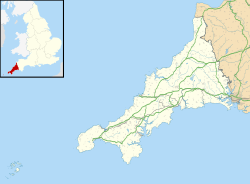Mawgan Porth Dark Age Village
| Alternative name | Porthglyvyan |
|---|---|
| Location | Mawgan Porth grid reference (SW851672 |
| Region | Cornwall |
| Coordinates | 50°26′05″N 005°00′47″W / 50.43472°N 5.01306°W |
| Type | Ancient village |
| History | |
| Founded | c. 850 AD |
| Abandoned | c. 1050 AD |
| Periods | Early Middle Ages (Dark Ages) |
| Cultures | Dumnonia |
| Site notes | |
| Excavation dates | 1949-52, 1954 and 1974 |
| Archaeologists | Rupert Bruce-Mitford, Paul Ashbee, Ernest Greenfield |
| Condition | Ruins |
| Public access | Yes |
Mawgan Porth Dark Age Village is a small ancient settlement consisting of 3 courtyard house complexes and a cemetery on the North coast of Cornwall dating from the 10th century. It was excavated in 1950-54 by Rupert Bruce-Mitford. The site was first discovered after the apparent after the discovery of the skeleton in 1934. The landowner. Mr P A Wailes, had wanted to build on the land and soundings to test the subsoil revealed the skeleton, stone walls, pottery and bone fragments.[1]
Excavations
[edit]A trial excavation was carried out in 1948, and this led to larger scale investigation, between 1950 and 1954[2]
Cemetery
[edit]The cemetery contained several adult and child burials enclosed in slab graves. Pottery finds from the excavations form were distinctive forms, partly inspired by the bar-lug tradition of Scilly and Cornwall
Finds
[edit]Finds from the site are archived at the British Museum and negatives of Charles Woolf's photographs are held by the Photographic Library of English Heritage
Dark Age Cornwall
[edit]At one time, very little was known of the period known as the 'Dark Ages' in Cornwall.[3] The Cornwall edition of Victoria County History, only lists stones crosses and the silver hoard that was found at Trewhiddle in 1974. However, the Trewhiddle hoard is one of the finest collections of Early Medieval silverwork found in Britain.
More recent[4] excavations at Tintagel as well as previous digs at Duckpool,[5] St Pirans Oratory near Perranporth[6] and a Settlement excavated at Gunwalloe paint the picture of a vibrant country with a rich and literate elite.
External links
[edit]- British Museum collection Picture of a Bar lug cooking pot excavated at the site
Further reading
[edit]- A Dark Age Settlement at Mawgan Porth, Publisher: Routledge 1956, by Rupert Bruce-Mitford
- Saxon England: by John Hamilton (Author), Alan Sorrell (Illustrator) 1964. ISBN 0718808088
- Supposed Iron Age Burial at Mawgan Porth (JRIC No 83, Vol XXIV, 1936), Hirst, FC, 1936,
- 'Mawgan Porth Remembered', Cornish Archaeol. 37–8 (2002 for 1998–9), Ashbee, Paul
References
[edit]- ^ "Revealing Mawgan Porth's ancient settlement". Newquay Voice. 1 August 2003. Retrieved 13 August 2018.
- ^ "MAWGAN PORTH - Early Medieval settlement". Heritage Gateway. Historic England. Retrieved 14 August 2018.
- ^ "Cornwall 410 – 1066". Cornwall Heritage Trust. Retrieved 14 August 2018.
- ^ "Second Inscribed Stone found at Tintagel". Current Archaeology. Retrieved 7 June 2020.
- ^ "Duckpool Archaeological Excavation 2017, Morwenstow, Cornwall (OASIS ID: cornwall2-287530)". Archaeology Data Service. Retrieved 7 June 2020.
- ^ Bruce-Mitford, R.L.S. (24 October 2014). Recent Archaeological Excavations in Britain: Selected Excavations, 1939-1955. p. 171. ISBN 9781317606727. Retrieved 14 August 2018.

